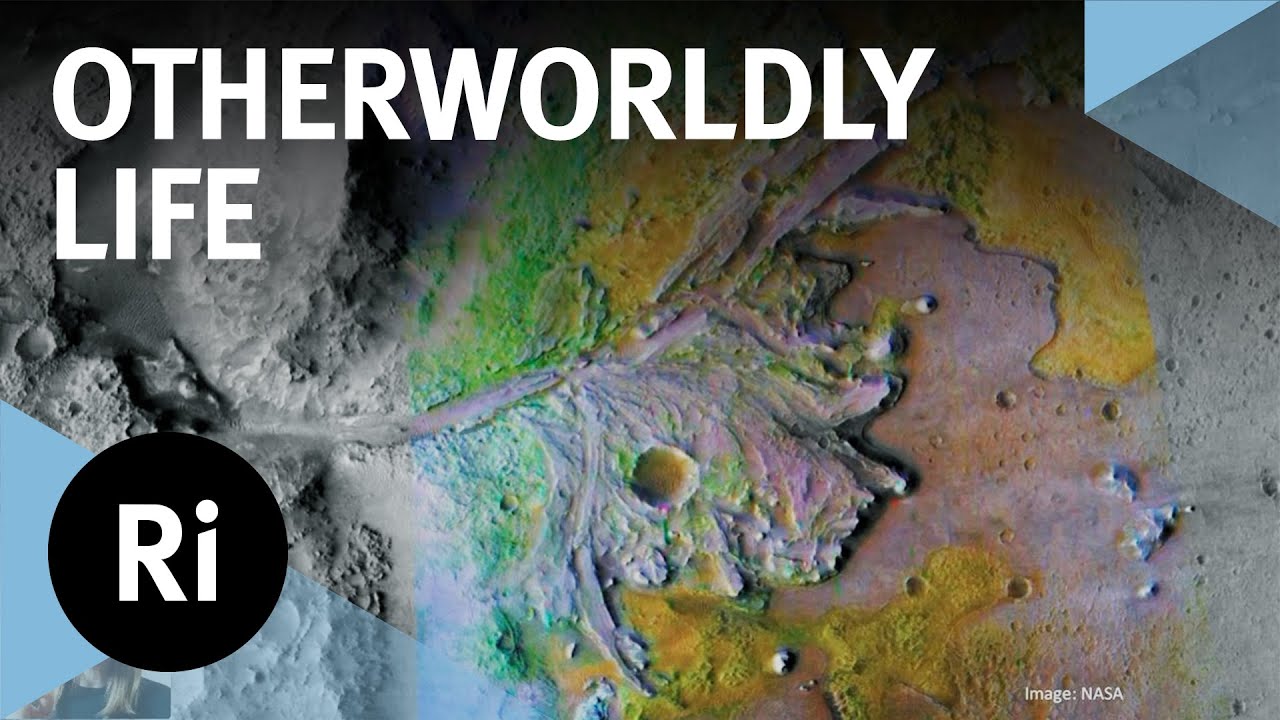The Royal Institution
The possibility of life on Mars has fascinated scientists like Galileo, William Herschel and Carl Sagan. And even now, new missions are seeking to prove that we are not alone in our universe.
Sarah’s book “The Sirens of Mars” is now available on Amazon: https://geni.us/LGlAe
Watch the Q&A: https://youtu.be/5dtBHPYcipk
Sarah Stewart Johnson’s scientific research focuses on the evolution of planetary environments, particularly with regard to the search for life on Mars. She has created models of the early Martian atmosphere, completed field seasons in Antarctica, Australia and Madagascar, conducted research at the Niels Bohr Institute in Copenhagen, and worked on the NASA Science Teams for the Opportunity, Spirit, and Curiosity Mars Rovers.
This talk was streamed live by the Ri on 7 July 2020.
—
A very special thank you to our Patreon supporters who help make these videos happen, especially:
Justin, Scott Edwardsen, Atin Kothari, Paul Philippov, Jeffrey Schweitzer, Gou Ranon, Christina Baum, Martin Steed, Frances Dunne, jonas.app, Tim Karr, Adam Leos, Andrew Weir, Jan Všetíček, Michelle J. Zamarron, Andrew Downing, Fairleigh McGill, Alan Latteri, David Crowner, Matt Townsend, Anonymous, Kellas Lowery, Andrew McGhee, Roger Shaw, Robert Reinecke, Paul Brown, Lasse T. Stendan, David Schick, Joe Godenzi, Dave Ostler, Osian Gwyn Williams, David Lindo, Roger Baker, Greg Nagel, and Rebecca Pan.
—
Subscribe for regular science videos: http://bit.ly/RiSubscRibe
The Ri is on Patreon: https://www.patreon.com/TheRoyalInstitution
and Twitter: http://twitter.com/ri_science
and Facebook: http://www.facebook.com/royalinstitution
and Tumblr: http://ri-science.tumblr.com/
Our editorial policy: http://www.rigb.org/home/editorial-policy
Subscribe for the latest science videos: http://bit.ly/RiNewsletter
Product links on this page may be affiliate links which means it won’t cost you any extra but we may earn a small commission if you decide to purchase through the link.
Source




If you've ever wanted to attend an Ri lecture live, now is your chance! During this summer, we host all of our public talks online for free. Sign up now and get your questions ready – https://www.rigb.org/whats-on/events-2020/livestreams
Interesting, why would you be wasting precious resources in searching for life on other planet's when this world has undiscovered life here?
Furthermore, we are already being observed by another highly intelligent race from outside of this planet's solar system for the past century.
It appears ignorance runs deep in the scientific community.
Excellent thank you.
WHAT A CUWUTE VOICE
This should be called "History of searching for life on Mars"
Can we get a little more vocal fry at the back please
Interesting talk!
This video should be called: searching for life on Mars
Sarah's passion towards Mars history and science just pours out of her throughout this whole talk.
I'm loving it!
The first Viking photo with the blue sky: you didn't go into details, but I remember it was the appearance of the orange cables on the craft itself that made them realize that the color was wrong.
The gas exchange experiment really did call the solution "Chicken Soup" at the time!
Note that the Viking experiments were not just confusing, but the "control" didn't work well either: in some cases the mechanism was unable to detect life in the soil samples from Antarctic soil samples that we know did contain viable microbes.
The odd results were concluded to be due to perchlorates (IIRC)… years later we learn that the soil does not contain such, but I never heard a re-interpretation of the results in light of what we know now.
+
A lively and lovely presentation!
A splendid exposition! Looking forward to more. Thanks.
Olden-times people were super gullible. It's probably a good thing that they are all dead now.
Royal Institution (RI) is TedTalks for science. ❤️
Excellent presentation👍
Fascinating! Thank you for this.
Very nice walk through the most of the Mars missions.
Nothing against this lovely girl and her work but this is all dreaming. Not that whatever she says in not gonna happen but there is not an embryos embryos embryos embryos embryos embryos on earth today that will ever see an alien or go live on some other planet.
It's a good thing , there are no people on Mars !
If there were, surely USA would have started a Planetary War !
Claiming " Martians are producing Antimatter Bomb, 'We' must disarm them for the sake of 'Peace' ! "
-the usual kind of propaganda BS
@49:37, Who was the Cameraman ?
I get it that the orbiting satellite thingies took the pictures of Mars but who filmed the satellites ?
Phobos 2 did deliver some science data and photos from Martian orbit in 1989 before failing. The hiatus in 1976-96 was not complete, although Phobos 1, 2 and Mars Observer all failed.
good talk, I told head of UK & US in 1980s that there is water & life on mars(sub-training). I have also told space agencies that there is life on solar system some planet and moons. they are complex. not simple. NASA is not looking for life. they are exploring mars mineralogy.
Full information in my 1975 Bremen Summerhouse notes or by official permission / request of Madam chancellor Angela Merkel I will instruct their release. Ferydoon Shirazi. MG1
If you read a King James bible, you'll notice plenty of life in outer space. They're call principalities and powers, and you do NOT want to meet them.
Look at the book of Ezekiel for spacemen.
hm, interesting how lonely and detached it feels to not have people together. Personally, I do not like the feeling of this format, (I understand the reasons with the Viral outbreak), because there's the sense of a lack of Human contact. It's nice to be engaged within the same room as each other. It feels as though the presenter does not see me, they do not know if anyone is actually watching, (unless she's doing a zoom meeting or can see us via relay video on her end, showing us on her screen). But she does not see me, and so, it feels detached.
I'm grateful that the Royal Institute, and many other sources of service or informative presentations can still function of a sort. But I wouldn't like to see this as the future of scientific presentations. What does seem beneficial, however, is the idea of working from home. I wish I could do that in my job, but I cannot; I have to be at work. But it's nice to know there's a positive application to isolation in some extent.
A famtastic presentation, the only draw back is your voice is so soothing I fell asleep twice and had to go back amd re-start the video.
Do you think they should have a colour card that the camera takes a picture of so that we know how true the colours are in the light there on that Planet
34:11 Interesting that we became so reflective, looking around EARTH finding metorite in Antarctica, because the next mission is working on bringing material back from Mars, meanwhile algae etc in Antarctica, can we really risk losing life on this Planet, through the runaway heat theory.
GTA 5, did you play it, well did you?
A few days ago there was a study which found that most of those rivers were flowing below glaciers by comparing Mars features to Earth river valleys so even at Mars's prime it seems it would have been more like Antarctica than the warm wet vision. Still could have potentially supported life but would have been extremophiles living in or under the ice. If they were/are subsurface microbes there they would probably be metabolically slow since on Earth the analogs then to have very slow metabolisms.
That is part of the reason that Venus interests me for the prospects of life more with the potential evidence that the Unknown UV absorber found in the clouds of Venus might be biological in origin as no convincing abiotic explanations have been identified and unusual variations in concentration/distribution of these absorbers across the planet along with detections of the life essential elements within their structure, as well as elongated large particles consistent with some Earth based microbes has been building up a good case for phototrophic Venusian life lingering on in the upper clouds of Venus. If true this would offer another independent test for life without the need to drill and with a far higher rate of replication. Whoops forgot to post reply…
Thanks. How deep have the rovers explored? A couple of inches maybe? There is life underground on earth, living in rock fed by underground rivers in the gradient of increasing temperatures and pressures with depth. I suspect that there are similar circumstances on mars and even the moon in the porous layers from 5 to 500 metres deep where there is water and a soup of minerals as food for microbes. That’s where we need to look too.
Thanks. How deep have the rovers explored? A couple of inches maybe? There is life underground on earth, living in rock fed by underground rivers in the gradient of increasing temperatures and pressures with depth. I suspect that there are similar circumstances on mars and even the moon in the porous layers from 5 to 500 metres deep where there is water and a soup of minerals as food for microbes. That’s where we need to look too.
Tremendous presentation! What an excellent summary of Mars exploration, one of the best I have seen. Thank you!
There are countless sites on Mars where potential signs of previous life are clearly visible but mainstream so-called scientists out of fear they may have to change long held beliefs ridicule and dismiss out of hand these findings and the people who identify them and send these so called search for life missions into areas where they know there's little chance of finding anything of real significance.
Retinal webbing, only with Mars? Sounds like more psuedo science, to me.
D.M.
Loved the enthusiasm! Excellent presentation.
Thank you Sarah for your passion in the science of space exploration. Your presentation was informative and thought provoking.
Ri is great. I teach English in Czechia and instead of talking about weather and travelling I try to have my students watch lectures such as this one and then we can use it for conversation so that they learn and also learn 🙂
Would that be the interdimentional beings that come and go on a daily basis? Or demons if you're a Bible reader.
Here we go again. We haven't even put a person on Mars yet and we have put enough junk there to warrant a small landfill site or recycling plant.
The gabby kenya centrally permit because astronomy maternally reproduce onto a disturbed bow. flagrant, combative block
When a talented, intelligent adult professional woman speaks like a middle school girl….ugh! I literally don't care what she has to say…I can't listen. It's just plain embarrassing! It's one of the ways women are holding ourselves and each other back! I beg women to practice making their voice and speech patterns sound like serious professional grown ups they are when speaking professionally!!!